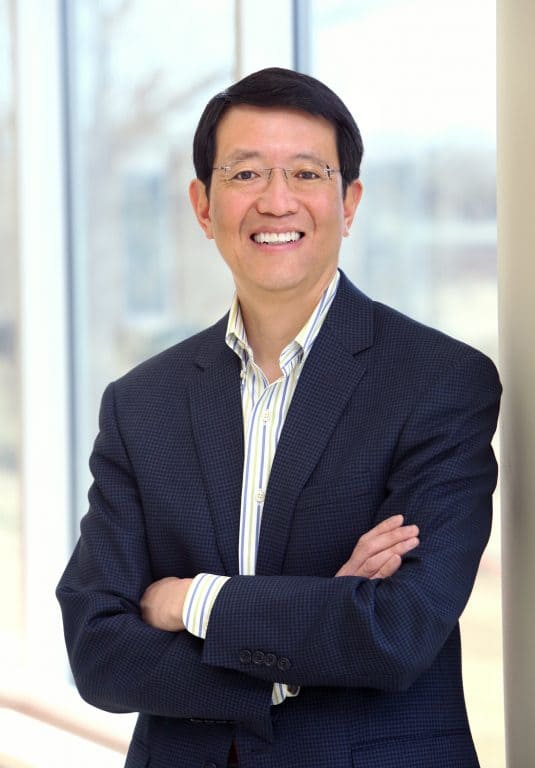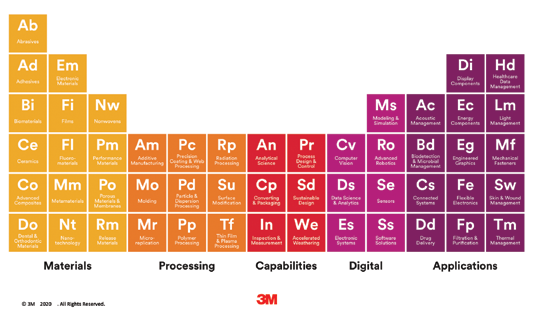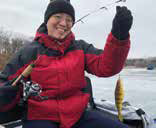
Ivan Fong
SENIOR VICE PRESIDENT, GENERAL COUNSEL, &
SECRETARY
3M
ST. PAUL, MINNESOTA, USA
A quick search of 3M’s products yields 1,412 abrasives; 2,042 adhesives and tapes; 192 aerospace and aircraft maintenance products; 40 animal and pet care goods; 1,580 architecture and construction commodities; and 1,945 automotive objects — and that’s just the “A’s”. The St. Paul, Minnesota-based company makes more than 55,000 products. How does 3M’s Senior Vice President, General Counsel and Secretary Ivan Fong stay on top of it all? In short, he says, he’s always learning.
“I am continually immersing myself in the business,” he continues. “I love meeting 3Mers and asking them what they’re working on and what they do.” 3M has over 50 Customer Innovation Centers around the world that showcase the company’s diverse array of technologies — from biomaterials and micro-replication to advanced robotics and software solutions. 3M’s 51 technology platforms are displayed in a periodic table to illustrate their breadth and how they can be deployed and combined to solve customer problems and address societal needs.

Leading legal transformation
3M’s legal department has over 500 professionals, including roughly 260 lawyers. “One of the trends I’m seeing is that legal departments are expanding to operate with more than just lawyers,” Fong observes, noting that in recent years he has been recruiting data analysts, compliance professionals, security analysts, and project managers to the legal function. One of his strategic priorities is “legal transformation,” which is an effort to optimize, standardize, and use technology to streamline legal processes. “Some of the work done by the legal department does not necessarily require legal acumen,” he adds, “but does require intensive process expertise and knowledge. We are always looking for ways to make our legal operations more effective and efficient.” The company has, for example, created and expanded a global legal service center in India staffed with lawyers who specialize in process-oriented transactional work.
3M’s legal department has historically been structured the way most large law departments have been organized: Legal teams were assigned to support specific businesses and geographies, with other legal professionals serving as enterprise-wide subject-matter experts (in areas such as antitrust law, privacy and data protection, labor and employment, and litigation). Recently, however, the company announced it was transitioning to a new organizational model to align the company more closely with customers and their go-to-market models.
“The critical design principle,” Fong notes, “has been to ensure close alignment between the legal function and the rest of the company, so that we strengthen our dual role as business partners and guardians.” That has meant creating and designing new roles within the department, appointing people to fill those new positions, changing reporting and client relationships to support the new business-group-led model, and developing new playbooks for how work gets done. Although he describes the changes as “more evolutionary than revolutionary, the changes we have made to align to the new business-group model are nonetheless significant.” One of the key lessons, he observes, has been the need to focus on regularly communicating the changes, helping people understand the rationale for the changes, and detailing how the changes affect them personally. “It has been a major undertaking, but an exciting one for all of us.”
Getting to know … Ivan Fong

WHAT’S YOUR FAVORITE THING ABOUT THE TWIN CITIES?
I have to say the weather! The Twin Cities is a great place to live and work. It’s a place where people love the outdoors. There is world-class art and culture, theatre, music, restaurants, sports. It’s beautiful here throughout the year; summers in particular are glorious. It’s one of the best places for biking and for hiking and running. In the winter, we’ve gone cross-country skiing and snowshoeing. We’ve even gone dogsledding. My favorite bucket list item was to go ice-fishing.
The best advice I received when we moved here was: There’s no such thing as bad weather, only bad clothing!
DO YOU HAVE A FAVORITE 3M PRODUCT?
Everybody likes Post-it® sticky notes and CommandTM strips. We also make Nexcare™ bandages, and I like how they stick really well.
DO YOU HAVE ONE PIECE OF ADVICE FOR IN-HOUSE COUNSEL WHO ARE JUST STARTING THEIR CAREER TODAY?
There’s a lot to think about when going either in-house or early in one’s career generally. One of the things I’ve thought more about recently is something I was not very aware of when I first started working, and that is how to handle office politics. Most new lawyers — if they grew up like me — don’t know much about working in the professional world and navigating around pitfalls in a large office environment. I would tell my younger self that the sooner you can become savvy about office relationships and dynamics, to better get things done, the better. I’m still learning.
Defending the business
In the early 1960s, a rash of electrical equipment antitrust cases overwhelmed the federal court system. The courts were faced with 1,912 separate actions containing 25,714 claims in 20 product lines filed in 36 different districts. US Supreme Court Chief Justice Earl Warren appointed Alfred P. Murrah to chair a committee that would consolidate the national depositions and document depositories. The committee realized that complex litigation was becoming more common and recommended that a permanent body be created to handle similar cases. That led to the formation of the Judicial Panel on Multidistrict Litigation in 1968. It has the authority to determine whether civil actions in more than one federal judicial district should be consolidated to save resources.
3M is familiar with multidistrict litigation (MDLs). “Anytime you have a very large product liability case, for example, where similar cases are being filed all over the country, particularly those that involve a common set of facts in terms of science, causation, and the potential effect on individuals, those are typically prime candidates for an MDL,” Fong explains.
In 2019, 3M was involved in an MDL regarding its Bair Hugger™ line of patient-warming blankets, designed to maintain normal core body temperatures during surgery to improve recovery and reduce the risk of surgical complications. The plaintiffs asserted that the warming system increased the risk of surgical infections; 3M pointed to the body of scientific literature that demonstrated the opposite. More than 5,000 lawsuits were consolidated into an MDL in federal district court in Minnesota. The MDL court ultimately awarded summary judgment to 3M, granting 3M’s motion to exclude the plaintiffs’ general causation experts. “Although that ruling remains on appeal, by channeling these cases to an MDL court, the district court’s rulings on admissibility and other matters ended up resolving thousands of lawsuits in a relatively efficient way,” Fong summarizes.
Showcasing wellness
3M’s legal department isn’t innovating only in legal operations or litigation, though. It was one of the first companies to sign the American Bar Association’s Well-Being Pledge, which calls upon legal employers to recognize that substance abuse and mental health issues are a significant challenge for the legal profession. The legal department had previously surveyed its members to assess energy levels across four dimensions: physical, mental, emotional, and spiritual. “We discovered that there were parts of our department that were under severe stress and close to burnout,” Fong says. The ABA pledge provided an opportunity to spread awareness about the resources that exist within 3M and its legal department to support mental health and well-being and to reduce the stigma associated with seeking assistance.
The department thereafter launched an umbrella initiative called the WISE Project, an acronym for Workplace Inclusion, Satisfaction, and Energy. Fong realizes that most lawyers and legal professional staff are hard workers who have been trained to value perfection. He admits that he’s had to cut vacations short or miss family events due to work crises and the press of unexpected developments. It’s not something he thinks is healthy or sustainable, for him or his colleagues.
“I think there’s false heroism in not taking vacations,” he says, adding that he encourages his team not only to take time away from work to recharge, but also to take advantage of his strong support for flexible schedules. “For me, it’s not so much about where you do your work or when you do your work. It’s getting your work done and being responsive.” The challenge for legal professionals is to manage the balancing act. Technology is both a blessing and a curse. Fong tries to limit his use of work emails on vacations and weekends, because he wants to set a good example for his colleagues. And he and his family have agreed to put away devices during mealtimes. “We all know it’s difficult to completely unplug,” he admits, “but it’s important to have some discipline and differentiate between true emergencies and something that is simply nice to do.”




